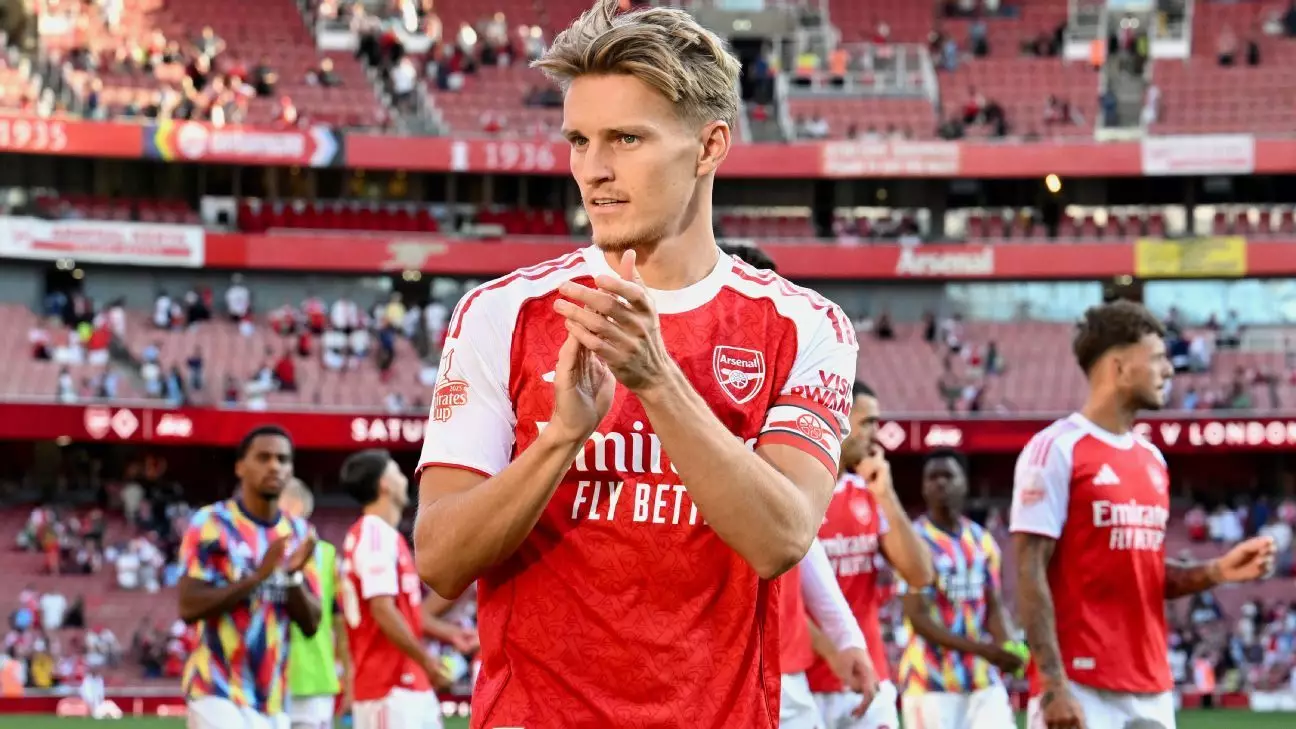In the often tumultuous realm of football, the choice of captaincy signifies more than just an on-field decision; it embodies team cohesion, strategic confidence, and long-term vision. Arsenal’s recent handling of the captaincy debate around Martin Ødegaard exemplifies the importance of collective player input in leadership choices. Despite external criticisms, particularly from former legendary captain Tony Adams, who questioned Ødegaard’s suitability, Arsenal’s coaching staff demonstrated unwavering faith in the voting process led by the players. This transparent approach highlights a progressive stance: leadership is rooted in consensus, trust, and the players’ acknowledgment of who truly embodies the qualities necessary to unite and inspire a squad.
From the inside, it appears Arteta’s decision to retain Ødegaard signals a conviction that cannot be swayed by external narratives or nostalgic biases. The fact that the team overwhelmingly voted in favor of their captain suggests a shared sense of respect, understanding, and belief in Ødegaard’s ability to lead—not only in skill but in resilience, tactical understanding, and emotional support. This collective endorsement emphasizes a broader philosophy that modern football increasingly values player agency and leadership from within the squad, rather than purely traditional hierarchy.
Challenging Conventional Wisdom and Embracing Modern Leadership
Tony Adams’ assertion that Arsenal “are not going to win the league with Ødegaard as captain” is not just a critique of individual ability but undermines a shift in how leadership is perceived in contemporary football. Such statements often stem from the nostalgia for authoritative, charismatic captains of the past who commanded respect through sheer presence. However, the game has evolved: leadership now encompasses a blend of tactical intelligence, emotional resilience, and the capacity to galvanize a team despite setbacks.
Arteta’s response to Adams illustrates a broader truth—that leadership is ultimately about the players’ perception and comfort. When a team’s core members are confident in Ødegaard’s role, it creates a potent environment where collective effort is prioritized over individual ego. The manager also highlights that leadership is not a static trait bestowed solely on the most vocal or physically intimidating figure but an adaptive quality cultivated through trust, communication, and shared responsibility.
This approach reflects a modern paradigm shift: successful teams are built on internal consensus and psychological safety, where every member feels empowered to lead by example or voice support. Arsenal’s leadership model aligns with this ethos, signaling a move away from outdated notions of authority toward a more democratic and inclusive approach.
Strategic Management Beyond Leadership – Navigating Rule Changes and Discipline
While leadership tells part of Arsenal’s story, the club also faces modern challenges from a rule-enforced perspective, particularly concerning the enforcement of time-wasting penalties. Last season, disciplinary issues such as players kicking the ball away or goalkeeper delays resulted in early dismissals that could have been prevented with better game awareness and strategic discipline.
Arteta’s comments reflect an understanding that adapting to league rules is integral to maintaining a competitive edge. By acknowledging past shortcomings and stressing the importance of consistent enforcement, he signals a proactive stance: winning is not only about skill but also about mental discipline and adherence to regulations.
The manager’s optimism about the future of rule enforcement—bolstered by ongoing dialogue with referees—demonstrates leadership extending beyond the pitch. It signifies an ambition to cultivate a robust environment where players understand the importance of discipline, not just for avoiding sanctions but for demonstrating professionalism and strategic intelligence. This holistic approach underscores a football philosophy that blend tactical mastery with unwavering discipline.
A Glimpse into the Future: Confidence in Progressive Change
Arsenal’s current approach, especially in leadership decisions and gameplay discipline, reflects a broader confidence in evolution and adaptation. Rather than clinging to traditional hierarchies or reacting defensively to criticism, the club is demonstrating a readiness to embrace innovative models rooted in collective trust and strategic discipline.
This mindset not only signifies a renewed focus on sustainable success but also encourages fans and stakeholders to re-evaluate what it means to build a winning team in the modern era. Arsenal recognizes that leadership, discipline, and resilience are interconnected facets of excellence. Rightly or wrongly, the club’s stance boldly counters critics and nostalgic sentiments alike, confirming that real progress often requires challenging established norms and trusting in the collective wisdom of the team.
In the end, Arsenal’s journey illustrates that confidence, transparency, and a willingness to evolve are the key ingredients for sustained success. The club’s unwavering belief in their chosen leader, coupled with a strategic focus on discipline and rule enforcement, exemplifies their commitment to redefining what it means to be a top-tier football team. As they navigate this season, it will be not only their tactical prowess that defines them but their openness to growth and self-criticism—hallmarks of a truly ambitious and forward-thinking club.


Leave a Reply